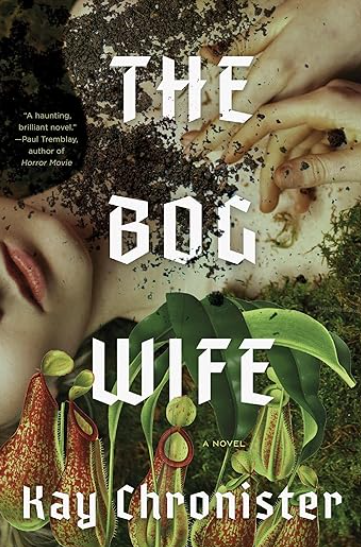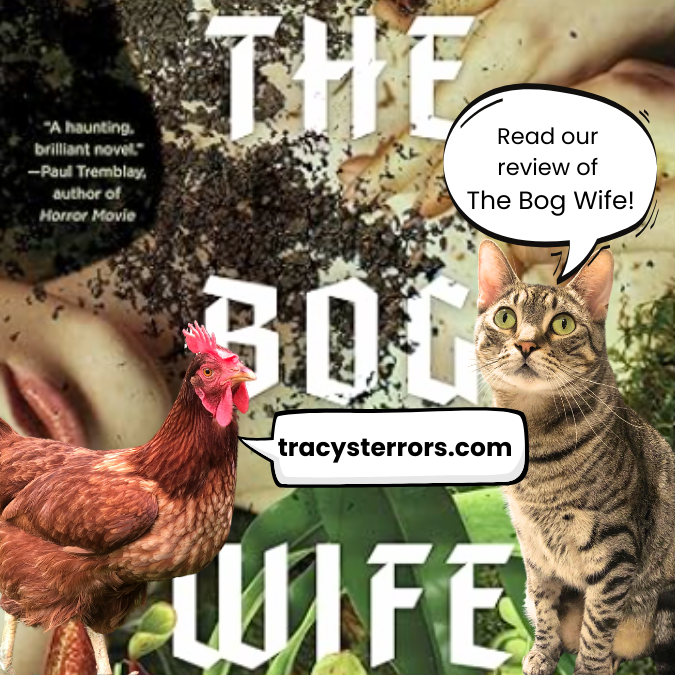

Spoiler Alert: OK, not a true spoiler–this book is too complex to have a simple ending that can be “given away.” Still, the review may tell you more than you want to know. No big deal. Read it anyway.
Kay Chronister’s The Bog Wife: A Novel (2024) is Frankenstein meets We have Always Lived in the Castle with a strong warning about environmental degradation. But more than a metaphor for the climate crisis and a retread of old tropes, it’s a well-informed engagement with the Gothic tradition that yields something sophisticated and original. While the Gothic mode has been with us for over 250 years, some of its signature features–specifically, its tendency to obscure the past and conceal uncomfortable truths–make it a poor match for the narrative demands of the present moment, a critical point in the history of the planet when we must honestly confront the unsustainability of our inherited cultural practices and use our creativity to devise less destructive alternatives. Chronister seems to suggest that these urgent needs cannot be met by the Gothic–at least not in its traditional form; and The Bog Wife, a novel that’s Gothic to its core, demonstrates all the ways in which the mode as it is typically conceived has outlived its usefulness. So, too, it implies, has folk horror, a much more recent category with which the Gothic often overlaps. Folk horror focuses on the predictable needs of a stable landscape which means that it can’t readily accommodate the changing nature of the bog at the novel’s center.
If a horror writer wants to address the most pressing issue of our time with these classic and beloved genres, how should they approach it? I would say exactly as Chronister does: She applies pressure to the conventions until they break. If we imagine folk horror and the Gothic as a creaky and undoubtedly gas-guzzling vehicle–something that obviously doesn’t meet modern emission standards–then Chronister drives this beater straight into the ground, leaving her characters stranded. Their only option is to find a new way forward, and it’s exciting to accompany them.
Since time immemorial, the Haddesley’s of West Virginia have had a compact with the bog. In each generation, the eldest son acts as the bog’s custodian and exchanges the body of his dead father or “patriarch” for a bog wife, a woman born of rotting vegetable matter, with whom to have children. Daughters are forbidden to marry; and through the men’s monogamous relationship with the wetland’s humanoids, the Haddesley’s bloodline stays noble and pure. At least this is the story that the adult siblings–Eda, Charles, Wenna, Nora, and Percy–have been told all their lives by their father. But when the siblings commit their patriarch to the peat, no bog-wife emerges for the eldest son, Charles, who has always been regarded by the family as something of a disappointment. With the ancient compact broken and the wetland drying up, the Haddesley’s are angry and adrift. Should they try to preserve the old ways by forcing the land into compliance or can they construct other lives on a different foundation?
In a savvy assessment of literary history, Chronister seems to suggest that the gothic impulse to generate false histories is no longer sustainable in the 21st century. From Horace Walpole’s Castle of Otranto (1764) onward, Gothic fiction has always reimagined the past in ways that allow characters (and readers) to confront, escape, or reconcile their anxieties. Continuing this tradition, the Haddesley history speaks to the siblings’ deepest fears and desires. It amplifies Charles’ feelings of sexual inadequacy and fuels his crisis of masculinity, while shoring up Percy’s confidence and justifying his desire to dominate the land. For Wenna, it’s a nightmare of environmental and human exploitation, a vision of horror that she had hoped to escape by fleeing the state.
But as Chronister shows, in the modern age, it isn’t possible for the Haddesleys–or for us–to permanently suspend disbelief or even to maintain that state for very long. By the third page of the novel, we know that the Haddesley compact is a racist fantasy. Clearly a family claiming its origins in Scotland cannot, at the same time, be “native” to North America and the first people ever to inhabit what is now West Virginia. Moreover, the Patriarch’s assertion that the Scottish Highlands and American Appalachians are, taken together, a single indivisible land, magically unified by the same mountains and water, is absurd. Even with his limited education, Charles knows that his father’s geography lessons don’t add up. And with a quick internet search–he’s free to go to the public library–Charles is able to discover the real history of dispossession and extractive capitalism that underlay his family’s fable. The truth is so easy to find. Certainly Wenna, who has been in the real world for 10 years, could have discovered it on her cell phone had she wanted to. And it’s this issue of will–of wanting to know the truth–that’s the crux of the story. The source of drama in the novel isn’t the hoax–Chronister doesn’t spend much time on how the patriarchs perpetrated it, nor does she raise tension by dragging out the revelation. Instead, she’s interested in what the characters will do once they can no longer plausibly claim ignorance. Their predicament is analogous to that of many Americans who have, even when confronted with staggering evidence, long denied the reality of the climate emergency. Now that they’re facing extreme weather events that threaten their continued existence, will they act (and vote) differently? I’m not hopeful.
While Chronister quickly dispatches with the family’s impossible origin story, she doesn’t go full Radcliffe in her rationalization of all things fantastic. A creature created through an occult bargain between man and nature, the siblings’ bog mother is the book’s Frankenstein monster; and like the abject figure of her literary predecessor, she is the “other” against which characters define their identities, functioning as a psychic trash can into which they jettison unwanted parts of themselves. Eda despises her mother’s lassitude and passivity because she hates these attributes in herself: She submits to the men of the family but secretly longs to usurp their authority and power. And it’s against his mother’s inertia that Percy outlines his own masculine energy, arguing that the very stolidity of the bog is a silent demand for someone–preferably himself instead of Charles–to master it. But while the bog wife is a magic mirror reflecting traits that the characters disavow, she is also an agent–very real and solid in her own right–sent to the Haddesley’s to speak on behalf of larger natural forces. Her diplomatic role got me thinking about how Chronister’s work intervenes in the genre of folk horror which is, at bottom, about the ritualistic ways in which humans interact with the land to appease the powers that live there.
Chronister’s novel suggests that climate change throws a wrench in the folk horror formula. In classic instances of the genre like Day of the Arrow (1964), the locals know with a certainty what the land requires of them; the trick isn’t in deciphering their obligations but in meeting them in time to stave off crop blight or some other agricultural catastrophe. However when the land, which has always seemed predictable and sure, suddenly changes due to extreme shifts in temperature and precipitation, then, as the Haddesley’s discover, all agreements are null and void or, at best, provisional. Breaking with other works of folk horror, The Bog Wife shows what happens when people and the land are out of sync and fundamentally misunderstand each other’s needs.
The novel resolves this confusion in a surprisingly clunky way. Unfortunately for us the planet isn’t going to send a representative to verbalize in stark terms what it really wants; though we–like the Haddesley’s–shouldn’t need it spelled out since we’ve had enough clues to guess. When the characters are finally forced to confront the truth of their situation, they cope with it in different ways, each response suggesting a possible route for humanity: We can recede back to a presocial, undifferentiated nothingness, which is to say, we can die. Or we can live peripatetic lives, indulging in kitsch and processed foods while circling the rim of a society going down the drain. Or we can forge new kinds of families that survive outside of capitalism and its destructive drives.
Undoubtedly there are many other options available, but mapping out the future of humanity is well beyond the scope of this or any other novel. What Chronister does is more than enough. The Bog Wife is a vital reminder (because deep down inside, we already know) that we can’t absolve ourselves and justify our present actions by mindlessly gesturing toward tradition. And in narrating our way through the environmental crisis, we’ll need to stress test old forms, reinventing them if it’s appropriate or abandoning them if it’s not. The Bog Wife shows us the way.